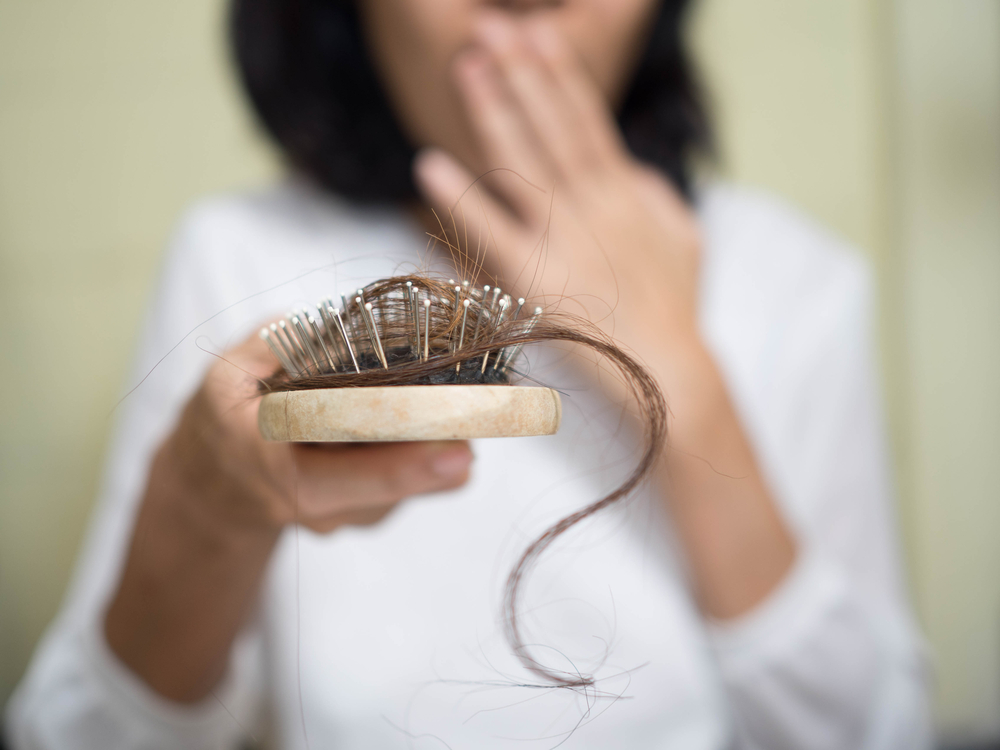We lose an average of 100 to 150 hair strands a day. That’s normal, and most of the time we barely notice it. But some health conditions can cause you to shed a scary amount of hair. If you’e wondering what’s causing your hair fall, check out this list — and see a doctor!
Telogen effluvium
Sounds like a spell out of Harry Potter, but this is actually a hair loss problem where you can pull of handfuls of hair. Yikes! It tends to happen after pregnancy, major surgery, drastic weight loss, or extreme stress. Sometimes it’s a side effect of medicines.
The cause: your hair speeds through the resting phase into the shedding phase at a much faster rate. The biggest indicator is that the fallen strand has little bulbs at the end, which means it completed a cycle of growth. Dob’t worry! This condition can be managed. See a doctor right away.
Hereditary baldness
Most hair loss is genetic. Most women experience thinning at the hairline, near the bangs. It can start as early as your 20s and become more obvious in your 30s. Your dermatologist can prescribe hair loss medications or treatments.
Hypothyroidism
Your thryoid controls your basal metabolic rate, or how your body uses oxygen and energy to stay alive and also grow hair, skin and nails. An overactive or underactive thyroid messes up these processes. You’ll notice you feel tired, moody, constipated. Your hair and nails will look more brittle. You’ll also notice changes in your skin. Many women also see dramatic swings in weight.
Thyroid problems need to be controlled, not just for your hair but your overall health! Your doctor can prescribe hormone meds. Once everything’s under control, your hair fall will stop too.
Lupus
Headaches, fatigue, swollen joints, hair fall, and extreme sensitivity to the sun? Have yourself checked for lupus. This condition a is often ignored because the symptoms are mild and can be mistaken for aging or other health problems. Have blood tests and a checkup with a rheumatologist who can look at your joints and tissues for signs of inflammation. Your doctor can prescribe meds and topical creams to treat scalp rashes and hair fall.
Iron deficiency anemia
Poor diet and heavy periods can lead to iron deficiency. Your body will lack blood cells that transport oxygen. Common symptoms are weakness, fatigue, pale skin, headaches, and hair loss.
To avoid iron deficiency anemia, eat plenty of iron-rich food like mmeat, leafy veggies, cereals and beans. You also need Vitamin C so your body can absorb the iron.
Polycystic ovarian syndrome
This is a hormonal imbalance that can cause infertility and manifest in symptoms like irregular periods, acne, hair loss or growth of facial hair. Your doctor may order blood tests and prescribe birth control pills to normalize your hormone levels.
Scalp diseases
An unhealthy scalp can cause inflammation that makes it difficult for hair to grow. Common scalp problems are seborrheic dermatitis (dandruff), psoriasis, and fungal infections such as ringworm. Look out for symptoms like yellowish scales on your shoulders or hair, white scales, or red patches. Your dermatologist can diagnose the problem and recommend medicated shampoos, oral meds, and light therapy.
Alopecia areata
There are different levels of alopecia, which can cause either patches of baldness on the scalp or eyebrows, or total hair loss on the face and body. Your doctor will treat it with corticosteroids and other prescription meds.
Hair loss doesn’t just affect your looks, it can be a good sign of your overall health. Always see your doctor if you notice significant hair fall, especially if it’s accompanied by other symptoms.

